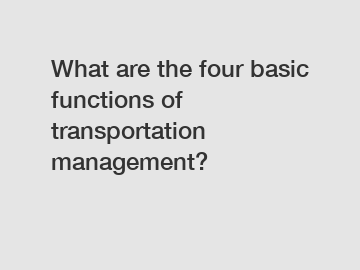What are the four basic functions of transportation management?
Transportation management plays a crucial role in the smooth operation of supply chains and logistics networks. It involves managing the movement of goods from one location to another efficiently and cost-effectively. To ensure the success of transportation operations, there are four basic functions of transportation management that must be effectively carried out.
**Planning**.
The first function of transportation management is planning. This involves deciding on the best routes and modes of transportation to use for moving goods from the point of origin to the final destination. Proper planning takes into account factors such as cost, time, and the nature of the goods being transported. It also involves forecasting demand, scheduling shipments, and coordinating with carriers and suppliers to ensure timely deliveries. Effective planning helps optimize transportation resources, reduce costs, and improve overall efficiency.

**Execution**.
Once the transportation plan is in place, the next function is execution. This involves the actual implementation of the transport plan, including the coordination of carriers, tracking shipments, and monitoring performance. Execution also involves handling any unforeseen issues that may arise during the transportation process, such as delays, route changes, or accidents. Effective execution ensures that goods are delivered on time and in the best condition possible, meeting customer expectations and maintaining the reputation of the business.
**Control**.
The third function of transportation management is control. This involves monitoring and measuring the performance of transportation operations against predefined metrics and key performance indicators (KPIs). By tracking factors such as delivery times, costs, and service levels, transportation managers can identify areas for improvement and take corrective actions as needed. Control also involves managing risks, such as disruptions in the supply chain or changes in regulations, to ensure continuity in transportation operations. Effective control helps optimize performance, reduce costs, and increase customer satisfaction.
**Evaluation**.
The final function of transportation management is evaluation. This involves analyzing the results of transportation operations and identifying opportunities for improvement. By reviewing performance data, trends, and feedback from customers and stakeholders, transportation managers can identify areas where efficiency can be increased, costs can be reduced, or service levels can be improved. Evaluation also involves conducting regular audits and reviews of transportation processes to ensure compliance with regulations and best practices. By continuously evaluating transportation operations, businesses can stay ahead of the competition and adapt to evolving market conditions.
In conclusion, the four basic functions of transportation management – planning, execution, control, and evaluation – are essential for the success of supply chains and logistics networks. By effectively carrying out these functions, businesses can optimize transportation resources, reduce costs, improve efficiency, and enhance customer satisfaction. Contact us to learn more about how our transportation management solutions can help your business succeed.
The company is the world’s best Courier Software for eCommerce solution, Logistics Software Experts vender, top 10 logistics system supplier. We are your one-stop shop for all needs. Our staff are highly-specialized and will help you find the product you need.
68
0
0


Comments
All Comments (0)